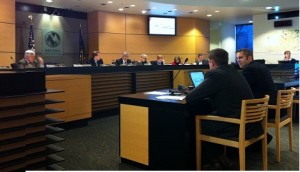The U.S. Department of Transportation has issued a record of decision approving the environmental phase of the Columbia River Crossing Light Rail project, allowing the project to move forward with land acquisition and pursuit of final funding.
The $10 billion* plan will replace the current Interstate Bridges with a wider 10-lane span, reshape five major highway interchanges on either side of the bridge, and extend light rail from Portland to Vancouver.

Kris Srickler, deputy CRC cirector and Ryan LeProwse, David Evans & Associates engineer appear at Metro.
Proponents say the project will ease congestion, improve safety within a five-mile corridor surrounding the bridge, and ensure the expansion of light rail – something Clark County voters have soundly rejected in the past.
However, funding assumes a three-way split between the Oregon and Washington Legislatures, the Federal Transit Authority, and more than $1 billion in tolls. As of yet, none of this funding has been secured.
The project could die if state lawmakers, already facing major budget deficits, deem the project too expensive.
CRC staff called the federal approval of the project’s final environmental impact statement (FEIS) a key milestone.
“I think this validates all of the work this project has been doing in the last six years, and I certainly appreciate the work the folks have done to understand the issues,” CRC Director Nancy Boyd said Wednesday following a day-long meeting in Portland with Oregon lawmakers who have legislative oversight of the CRC. “I’m thrilled to get to this point.”
Boyd acknowledged that how and when construction unfolds will depend upon the funding available, but she feels the time to discuss project alternatives is over.
“We really have reached a point where we need to move forward,” she said.
Opponents, however, doubt the bridge will actually ease congestion, given that traffic bottlenecks will continue further south in downtown Portland. They also have raised concerns about project costs ballooning to more than $136 million, and they say CRC staff violated the National Environmental Policy Act (NEPA) process by rejecting reasonable, and cheaper alternatives, without sufficient analysis.
They see the federal decision as a farce.
“I believe that it was premature to send out the FEIS because all local concerns had not been met,” said Portland resident Sharon Nasset, a proponent of a third bridge alternative that would improve freight traffic. “We still have an enormous amount of things to decide.”
* The well-documented cost to taxpayers, if the CRC stays on budget, is $10 billion. This was established by the Cortright Report (PDF) which used data from an independent review panel hired by the governors of Washington and Oregon. (View the panel’s final report.)
See our continuing coverage of the Columbia River Crossing Light Rail project.
Do you have information to share on the CRC? To respond anonymously call 260-816-1426. To allow your comments to be used on COUV.COM call 260-816-1429.









